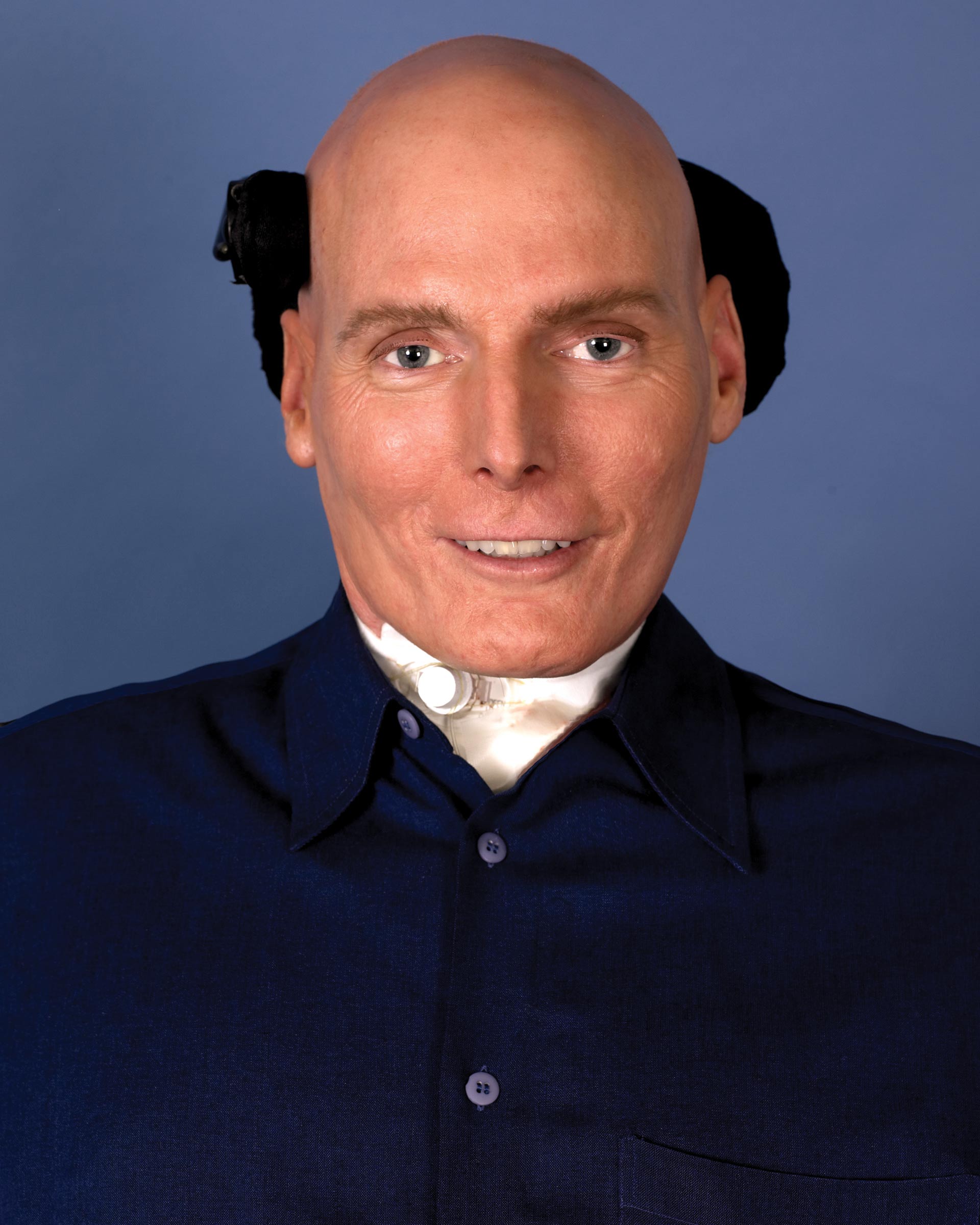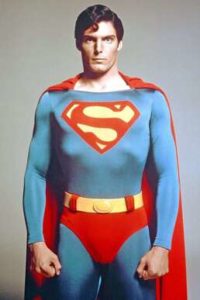
When Christopher Reeve starred as Superman on film, he was the man of steel. Faster than a speeding bullet! More powerful than a locomotive! Able to leap tall buildings in a single bound! He had superhuman strength and his body was indestructible. Superman was Christopher Reeve’s first major movie role. Because he went on to play the superhero in four blockbuster movies, the public came to see no distinction between Superman and Reeve himself. When Christopher Reeve walked down the street, he was often mobbed by people who said things like, “Superman, you’re my hero!”
 Of course, to Christopher Reeve, Superman was just another role he played on the big screen. Acting was his profession and he enjoyed the thrill of playing complex characters. He was in demand as an actor, appearing in 33 films and 31 plays. In one film, he might play the part of a villain, in the next a hopeless romantic, and in the next a hero who saves the world from nuclear annihilation. Reeve was not an overnight success as an actor, however. He worked hard over many years to hone his craft. While in high school, he often had the starring role in school plays, before moving on to take smaller roles in local theater productions. In 1973 Reeve was accepted to Juilliard, one of the finest performing arts schools in the country. Of two thousand students who auditioned, Reeve was one of 20 invited to enroll. In addition, he was one of only two students selected to participate in an advanced program at Juilliard. The other student was Robin Williams, who went on to become a famous actor and comedian.
Of course, to Christopher Reeve, Superman was just another role he played on the big screen. Acting was his profession and he enjoyed the thrill of playing complex characters. He was in demand as an actor, appearing in 33 films and 31 plays. In one film, he might play the part of a villain, in the next a hopeless romantic, and in the next a hero who saves the world from nuclear annihilation. Reeve was not an overnight success as an actor, however. He worked hard over many years to hone his craft. While in high school, he often had the starring role in school plays, before moving on to take smaller roles in local theater productions. In 1973 Reeve was accepted to Juilliard, one of the finest performing arts schools in the country. Of two thousand students who auditioned, Reeve was one of 20 invited to enroll. In addition, he was one of only two students selected to participate in an advanced program at Juilliard. The other student was Robin Williams, who went on to become a famous actor and comedian.
Outside of acting, Reeve was a good student and an outstanding athlete. He excelled at hockey, soccer, baseball, and tennis. As an adult, he maintained an athletic physique and became more of an outdoorsman. He was a talented downhill skier and frequently traveled to popular ski resorts around the world. Sailing became another one of his favorite activities. When not working, he would explore the vast sea in his sailboat. Reeve also earned his pilot’s license and bought an airplane. On two separate occasions, he retraced Amelia Earhart’s famous voyage by making solo flights across the Atlantic Ocean to Europe. When Reeve was in his thirties, he discovered a new passion—riding horses in jumping competitions. He loved the competition and sense of independence that riding gave him. Reeve truly felt at home while in the saddle. Before a fateful day in 1995, Reeve trained at least five times a week. As a result, he and his trusted horse, Buck, did well in numerous competitions.
At the age of 42, Christopher Reeve was enjoying success in his professional and personal life. He was scheduled to play the lead in a new movie called Kidnapped and was preparing to undertake his directorial debut in the romantic comedy Tell Me More. He had also received his own star on Hollywood’s Walk of Fame and had hosted Saturday Night Live. His personal life was equally rewarding. He was married to the love of his life, Dana, and she had recently given birth to their son, Will. Reeve also enjoyed solid relationships with his two older children, Matthew and Alexandra. The summer was fast approaching and that meant traveling, family time, and plenty of outdoor activities.
 On Memorial Day weekend of 1995, Reeve was scheduled to ride his horse in a competition in Vermont. At the last minute, he changed his mind, deciding to join some friends at another competition in Culpeper, Virginia. The day before the competition, Reeve walked the cross-country course to plan how he would guide his horse through the jumps. The next day, he repeated this ritual to make certain that he was prepared for the competition. Reeve was not worried about the third jump on the course since it was only three feet tall. After plotting his strategy, he returned to the stables and told a friend that he was looking forward to a good ride. Reeve later wrote, “From that moment until I regained consciousness several days later in the intensive care unit at the University of Virginia, I have no memory of what occurred.” He did not remember that his horse suddenly stopped just as he was supposed to jump the third gate. He did not remember that his horse bucked, sending him head first into the third gate. He did not remember that his hands got tangled in the bridle, leaving him unable to break his fall. And he did not remember lying on the ground gasping for air as he fought for his life. The mind has a funny way of protecting people from terrible events that dramatically change their lives forever.
On Memorial Day weekend of 1995, Reeve was scheduled to ride his horse in a competition in Vermont. At the last minute, he changed his mind, deciding to join some friends at another competition in Culpeper, Virginia. The day before the competition, Reeve walked the cross-country course to plan how he would guide his horse through the jumps. The next day, he repeated this ritual to make certain that he was prepared for the competition. Reeve was not worried about the third jump on the course since it was only three feet tall. After plotting his strategy, he returned to the stables and told a friend that he was looking forward to a good ride. Reeve later wrote, “From that moment until I regained consciousness several days later in the intensive care unit at the University of Virginia, I have no memory of what occurred.” He did not remember that his horse suddenly stopped just as he was supposed to jump the third gate. He did not remember that his horse bucked, sending him head first into the third gate. He did not remember that his hands got tangled in the bridle, leaving him unable to break his fall. And he did not remember lying on the ground gasping for air as he fought for his life. The mind has a funny way of protecting people from terrible events that dramatically change their lives forever.
Unfortunately, just because Reeve does not remember the fall doesn’t mean it did not happen. It did. Reeve landed squarely on his head, and the fall broke his neck. It was the worst kind of neck injury. He shattered his first cervical vertebra (C1) and also broke his second vertebra (C2). The vertebrae are numbered from the base of the neck down the back toward the tailbone, with the lower numbers at the top. In a back or neck injury, the higher the site of the injury, the more severe it is. If an injury occurs at the C5 or C6 level, the victim usually becomes a paraplegic, losing feeling and control below the waist. For Reeve and others who break their C1 vertebra, the impact is more severe. Reeve’s injury resulted in no feeling below his neck. The accident left him a quadriplegic, meaning he no longer had the use of his legs or arms. Even worse, he was dependent on a ventilator to help him breathe.
Most people who break their C1 vertebra do not survive. They often die immediately from a lack of oxygen or contract pneumonia shortly after being injured. Soon after arriving in the intensive care unit, doctors took Reeve into surgery to reattach his head to his spinal column. He was given slightly less than a 50-50 chance of survival. At one point, he mouthed to his wife, “Maybe we should let me go.” She began to cry, but quickly found the words that would save her husband’s life. “I want you to know that I’ll be with you for the long haul, no matter what. You’re still you. And I love you.” Reeve found strength in her words and the love of his family. “I knew then and there that she was going to be with me forever,” he recalled. “My job would be to learn how to cope with this and not be a burden. I would have to find new ways to be productive again.”
How does a quadriplegic learn to cope with such severe injuries and not be a burden? Without the use of his arms and legs, Reeve was unable to do most of the things that able-bodied people take for granted. He could not feed himself, get dressed in the morning, brush his teeth, or go to the bathroom on his own. He was completely dependent on other people to meet his daily needs. Just moving Reeve from his bed to his wheelchair took a concerted effort from a team of nurses and aides. The help of health care professionals proved just as critical after he came home from the rehabilitation center; he required assistance 24 hours a day. However, there were some roles that his health care aides could not fulfill. Reeve was not able to hug his children, for example. He needed to sleep in a special bed, which kept him from sleeping in the same bed with his wife. For a man who had been an active participant in the game of life, it was an almost unbearable situation. Reeve once wrote, “I would say the worst part of it is leaving the physical world— having had to make the transition from participant to observer long before I would have expected.”
He spent many days pondering “what if” scenarios. What if he had gone to Vermont instead of Virginia that weekend? What if he had been able to untangle his hands and brace his fall? The biggest “what if” came from a doctor who studied the MRI of Reeve’s spinal cord. He told Reeve that if his head had been twisted a mere fraction to the left, he would have been killed instantly. On the other hand, if his head had been twisted a mere fraction to the right, he would have been on his feet in no time.
Without the ability to move, Reeve was tormented by his thoughts. At first he thought, “Oh God, I’m trapped, I’m in prison. I’ve got a life sentence here. I’m stuck, I’m never going to get out of this.” He also had moments of self-blame, thinking “I’ve ruined my life, and you only get one.”
 For many people, life without movement below the neck might not seem worth living. However, in his book Still Me, Reeve expressed feelings of hope and gratitude. Despite his injury and the resulting limitations, he filled his autobiography with words such as thankful, appreciative, lucky, and fortunate. Few people would have the courage to turn such a tragedy into a second opportunity at life. Reeve would be the first to say that the transition did not happen overnight. After the accident he was initially filled with self-doubt, suffering setbacks only a quadriplegic could fully understand. But Reeve slowly learned that he still had a lot to offer his family and the world. He could be a loving husband to his wife, a nurturing father to his three children, an advocate for other victims of spinal cord injury, and a source of inspiration to millions of people.
For many people, life without movement below the neck might not seem worth living. However, in his book Still Me, Reeve expressed feelings of hope and gratitude. Despite his injury and the resulting limitations, he filled his autobiography with words such as thankful, appreciative, lucky, and fortunate. Few people would have the courage to turn such a tragedy into a second opportunity at life. Reeve would be the first to say that the transition did not happen overnight. After the accident he was initially filled with self-doubt, suffering setbacks only a quadriplegic could fully understand. But Reeve slowly learned that he still had a lot to offer his family and the world. He could be a loving husband to his wife, a nurturing father to his three children, an advocate for other victims of spinal cord injury, and a source of inspiration to millions of people.
As much as possible, Reeve maintained a positive attitude. He learned to appreciate what he could do, instead of complain about what he couldn’t do. He could still think. He could imagine. He could hope. He could smile and laugh at a joke. He could tell his family how much he loved them. He learned to enjoy the small things in life, like the smell of freshly baked bread and the pure beauty of a sunrise. It wasn’t just his wife’s words that pulled him out of his depression. It was the knowledge that his children still needed him. He realized how unfair it would be to give up and give in to self-pity—unfair to himself and to his family. Slowly but surely, he changed his thinking. He found the best way to do that was to concentrate on the needs of others. As Reeve once commented, “You try to behave in the best manner you possibly can, the most loving way you can manage at any given moment…. Thinking that way helped me get past the ‘me-me-me’—my body, my problems, my condition, myself.” Reeve had the courage to move on and the wisdom to appreciate those who loved him most.
When the world first learned of Reeve’s injury, the reaction was shock and disbelief. Most people thought of Christopher Reeve and Superman as one and the same. And Superman is indestructible, right? The man of steel, right? For many of us, Reeve’s accident made us consciously aware that we are all mere mortals. If Reeve, the epitome of health and vitality, can fall victim to such a tragic accident, then it can happen to anyone. Reeve began to realize how fortunate he was. He was wealthy and could afford around-the-clock nursing care in his home. Even people with insurance usually have a million-dollar cap for extensive injuries. That might seem like a lot of money, but that amount can be spent in a matter of months by patients with spinal cord injuries. Most quadriplegics spend the rest of their lives in institutions because their insurance does not cover the care that is needed to lead a “normal” life. Reeve became increasingly frustrated and angered by this situation. He decided to do something for patients who were faced with restrictions on their care.
Reeve was not new to helping people. Long before his accident, he was actively involved with the Make-a-Wish Foundation, an organization that grants wishes to terminally ill children. Children often made a request to meet Superman, and Reeve would visit them in the hospital while dressed in his superhero costume. He also served as a volunteer track and field coach for the Special Olympics. He had been involved in many charities, but this time it was different. As a celebrity and a quadriplegic, he was in a position to help thousands of people suffering from spinal cord injuries. Clearly, he had enough of his own problems to worry about, but as he put it, “I had seen too much of their struggles and pain. I couldn’t go home, devote my life to myself and my family, and ignore the larger picture.”
Reeve was elected as chairman of the board for the American Paralysis Association. The organization’s mission statement is simple: “Find a cure.” He also established the Christopher Reeve Foundation, which has raised over $110 million to enhance the quality of life for disabled people. Reeve was committed to funding the work of scientists, doctors, and researchers striving to find a cure. He devoted a lot of time to hosting fundraisers and making speeches all over the country. He kept trying to convince politicians to spend more on research. Mike Manganiello, an executive with the Christopher Reeve Foundation, said, “I’ve never seen a greater lobbyist in my life than Chris. I saw him change people’s minds.” About half a million people become paralyzed each year due to a spinal cord injury, costing the government an estimated $8.7 billion a year to care for them. A fraction of that is spent on finding a cure.
In addition to his work with the foundation, Reeve got a second chance in the entertainment industry—this time as a director for the HBO movie In the Gloaming. The film was nominated for five Emmy Awards and won four Cable Ace Awards. In 2004, Reeve directed The Brooke Ellison Story, the heart-wrenching story of a college student who was struck by a car and became a quadriplegic, yet still graduated summa cum laude from Harvard. The real-life Brooke Ellison said, “I knew Chris would be able to tell my story with a sensitivity nobody else could bring.”
Reeve admitted that between his physical therapy, fundraising, and directing career, he was busier than he had been before his accident. In the nine years between his accident and his untimely death, he appeared at the Oscars, spoke at the Democratic National Convention, directed two films, wrote two books, and gave numerous speeches all over the world. A writer from Newsweek who got a glimpse of Reeve’s schedule once commented, “We should all be so disabled.” Reeve’s intent was to inspire able-bodied people to do more with their lives. As a quadriplegic, he had a different perspective on life, and at times, became frustrated with people who did not take full advantage of the opportunities they had been given. Reeve said, “I get pretty impatient with people who are able-bodied but are somehow paralyzed for other reasons.”
Despite all that he had on his plate, Reeve never passed up the chance to spend time with his family. He got up every morning to see his son off to school. He understood the importance of talking and listening to loved ones. After his accident, Reeve came to understand that “being” was better than “doing.” It still saddened him that he couldn’t play hockey with his son or teach him to ski, but Reeve understood how vitally important he still was to his son’s life. He was able to offer his son advice and support as he got older. Sometimes, Reeve said, he and his son sat and talked for hours. Every parent and child should realize the importance of this kind of time spent together.
Every day Reeve made an effort to finish his exercises and his daily business by 5:30 p.m. so that he could spend time with his family. They often watched sporting events on television together or shared the events of their day. Before Reeve drifted off to sleep each night, his wife climbed into his narrow bed to spend a few minutes together. Unfortunately, the special bed was too small for both of them to sleep on, but he was grateful that she could snuggle up to him every night. After the accident, Reeve learned to appreciate the little things in life, and never again took them for granted.
Reeve made it his goal to walk again. He endured hours of physical therapy every day so that when researchers discovered a cure for paralysis, his body would be ready. Many doctors told him it would be impossible to regain the use of his legs. However, Reeve refused to listen to naysayers. “I’ve just decided I won’t listen to the rules,” he said with his usual intensity and determination. Defying medical science, some five years after the accident, Reeve’s body began to regain some of its function. In a body that was supposed to be numb, he could once again feel pain and differentiate between hot and cold. “To be able to feel just the lightest touch is really a gift,” he said joyfully. “The fact is that even if your body doesn’t work the way it used to, the heart and the mind and the spirit are not diminished.” One of Reeve’s doctors, John McDonald, reported that Reeve regained limited movement in his right wrist, fingers, and toes, and before his death was working to regain movement in other areas of his body. Reeve also underwent groundbreaking surgery that allowed him to breathe without a ventilator. At first, he could only manage without the ventilator for a few minutes, but he ultimately worked his way up to several hours.
Unfortunately, Reeve never achieved his goal of walking again. On October 10, 2004, he died of cardiac failure resulting from an infection throughout his body. His wife and family were with him when he died. A private memorial service was attended by over 900 family members, friends, and admirers.
 In a moving tribute, entertainment critic Alex Sandell wrote, “It’s fitting he played Superman on screen, because in real life, Christopher Reeve was a hero.” Actor Michael J. Fox, who suffers from Parkinson’s disease, said, “Chris had far greater challenges than I’ve faced and faced them with a courage, intelligence, and a dignity I can only aspire to. If he could ever have walked, he would have walked over to help someone else get up.” Close friend and fellow actor Robin Williams said, “It’s hard for me to believe he’s gone because he was such a fighter and such a strong personality and soul to begin with.”
In a moving tribute, entertainment critic Alex Sandell wrote, “It’s fitting he played Superman on screen, because in real life, Christopher Reeve was a hero.” Actor Michael J. Fox, who suffers from Parkinson’s disease, said, “Chris had far greater challenges than I’ve faced and faced them with a courage, intelligence, and a dignity I can only aspire to. If he could ever have walked, he would have walked over to help someone else get up.” Close friend and fellow actor Robin Williams said, “It’s hard for me to believe he’s gone because he was such a fighter and such a strong personality and soul to begin with.”
There are several lessons to be learned from Christopher Reeve. First, life is fragile and can change in an instant. Tomorrow is promised to no one. Therefore, we should take advantage of what life has to offer today and appreciate each and every day. Compared to Reeve’s limitations, most of our problems are insignificant, or at least surmountable. Most people get caught up in the little things in life that don’t really matter and lose sight of their dreams for the future. In his second book, Nothing is Impossible, Reeve wrote, “So many of our dreams at first seem impossible, then they seem improbable, and then, when we summon the will, they soon become inevitable.”
We should not wait until a tragedy occurs to recognize all the gifts life has given us. Be thankful for those who love you. Spend time with them and let them know how much they mean to you. Be thankful that you can run, jump, hear, see, and live a healthy and active life. Remember that whatever hand life deals you, do not fold your cards. If you continue to believe in yourself and persevere, something positive will eventually happen. Whether we realize it or not, we are all given opportunities. Take advantage of them.
Before his death, Reeve was asked, “What is a hero?” He responded, “I think a hero is an ordinary individual who finds the strength to persevere and endure in spite of overwhelming obstacles.” Using this definition, everyone has the opportunity to be a hero. While most Americans would agree that Christopher Reeve was a hero, we should all recognize him as an outstanding role model who exhibited strong character to millions of people worldwide.
Discussion Questions
- Christopher Reeve was a famous actor. Where did he go to acting school and what famous actor was in his class?
- While at the top of his career, Reeve broke his neck in an accident. How did the accident happen?
- After his accident he wrote a book. What was it called and what was the main premise?
- How do we know that Chris made the adjustment from “why me” to appreciating what life still had to offer him?
- List the different jobs and roles that he accepted after being paralyzed?
- How does Christopher’s life inspire you and how can his life make you a better person?

great story
great story.
Carpe Diem = SEIZE THE DAY ! Thank you for the reminder to live our life to the fullest each and every day. We are not here to just be mediocre 🙂
Sad, but good story.
I like the story
1. It was a book
2. Chris made an adjustment
3. He didn’t have a job because he had no legs.
4. It inspired me by not losing my leg.
1. Nothing is Impossible is the book It’s about how you can do anything if you try.
2. making an adjustment
3. writer and movie creator
4. He inspires me to try more.
great story
Great story
Nothing is impossible, made an adjustment, writer and actor, and it incouraged me to try harder.
1. The book is you can do anything if you try your best and that anything is possible.
2. because you can do anything in life if you try.
3. He accepted being a writer and movie creator
4. He inspired me to never give up and that anything is possible if you try.
The book is called nothing is impossible. It’s about how you can do anything you want if you try. Because he had the money to not be bedridden. writer movie director and special olympic thing coach. He inspired me to Never Give Up, Never Back Down.
The book is called nothing is impossible. It’s about how you can do anything you want if you try. Because he had the money to not be bedridden. writer movie director and special olympic thing coach. He inspired me to Never Give Up, Never Back Down.
This is a very inspiring person, this inspired me to appreciate the things i do every day more.
1. Nothing is Impossible, he wrote “So many of our dreams at first seem impossible, then they seem improbable, and then, when we summon the will, they soon become inevitable.” this is what he said “We should not wait until a tragedy occurs to recognize all the gifts life has given us. Be thankful for those who love you”.
2 when he said that it was not all about him and his kids needed him.
3 got asked to be in the acting business again and became a movie director and made books too.
4 That you can give up and look at the good thing in life and don’t take stuff for granted.
nice story great …?
1.still me
2. he wasn’t going to let it define him
3.became America’s leading advocate for spinal cord injury research.
4.the entire concept of normality is subjective, based on individual experience rather than indisputable fact.
he tells the story of his life on both sides of the riding accident.
he knows he can’t change so he makes the best out of what he has
Directing In the Gloaming (1997) and acting in the television remake of Rear Window (1998)
you shouldn’t waste your time because you never know what gonna happen tomorrow
1. its main purpose was to talk about his life.
2. Because he was luck he made it.
3. You could make popcorn at a movie theater
4.To not take life as granted because you never know what tomorow will come.
1. Nothing is impossible and it is about how you can do anything if you try.
2. making an adjustment
3. writer and movie creator
4. He inspires me to try more.
1. Still me
2. wasnt going to let that define him
3. directing In the Gloaming (1997) and acting in the television remake of Rear Window (1998).
4. obsessive and single-minded
1. Still me
2. wasnt going to let that define him
3. directing In the Gloaming (1997) and acting in the television remake of the Rear Window (1998).
4. obsessive and single-minded
He wrote the book Still Me. It expressed hope and gratitude.
1. It was a book
2. Chris made an adjustment
3. He didn’t have a job because he had no legs.
4. It inspired me by not losing my leg.
1. It was a book
2. Chris made an adjustment
3. He didn’t have a job because he had no legs.